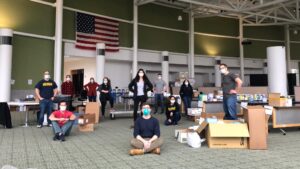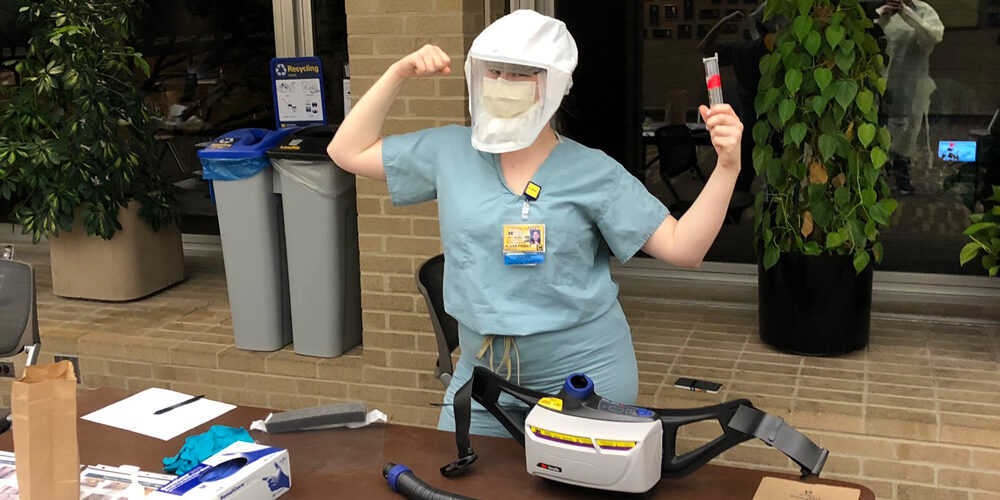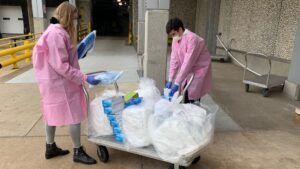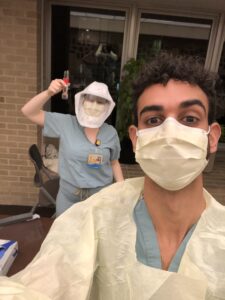“The skillset I had could benefit someone”
Michael Broderick had just woken up after working in the ICU the previous night when he read the email: U-M medical students were being pulled from their rotations due to the coronavirus pandemic. Broderick understood the order was for student and patient safety, but its full implications were unclear. Like many of his fellow students, he was compelled to act.
“I rushed to the hospital to figure out how I could help hand off my patients and to get more information on what this meant,” he says. “After saying goodbye to the residents, I walked home feeling kind of useless. Like many students, I felt that the skillset I had could benefit someone.”
While COVID-19 has elicited feelings of uncertainty and anxiety, it also has inspired a groundswell of humanitarianism. When the pandemic impacted their world, U-M’s medical students immediately wanted to make a difference — and they have. From sorting donated personal protective equipment (PPE) at the North Campus Research Complex to delivering groceries to vulnerable populations to rescheduling patient appointments, members of the quickly formed M-Response Corps have worked tirelessly to meet an endless stream of pandemic-related needs since mid-March.
Nadine Ibrahim, a fourth-year medical student, is one of four M-Response Corps co-leaders. She is both pragmatic and altruistic about the unanswered questions the pandemic raises for her.
“No one planned this, and we don’t know what the ramifications will be as far as our training for hospital rotations, but that isn’t foremost on our minds right now. We are in medical school because we want to help people,” she says.
Mobilizing

Students staff donation centers, like this one at North Campus Research Complex. (Image: @MResponse_Corps.)
When requests for help related to COVID-19 began to emerge and the list of students wanting to volunteer increased, Ibrahim knew something had to be done. She and fellow Medical School student leaders Broderick, Nicole Dayton, and Ali Hammoud formed M-Response Corps — and hit the ground running. A month later, 500 people have signed up — two-thirds of current U-M medical students. But that does not mean the other students aren’t helping.
“Every student has been a critical aspect of our COVID response,” Broderick says. “We, as leadership, are in awe of our initiative leads; individual volunteers; and of those choosing to stay home, valuing even more important aspects of life by protecting their health and their families.”
In addition to helping deliver groceries and sort medical supplies, M-Response Corps volunteers have provided childcare to their fellow students, checked on geriatric patients by phone, and rescheduled numerous patient appointments. Some have helped obstetricians with virtual visits to pre- and post-natal patients, trained hospital staff on PPE protocol, and answered COVID-19-related phone calls.
“As a medical student, you sometimes feel at the bottom of the medical pyramid,” Broderick says, “but the last few weeks have allowed students to demonstrate that we are a powerful force for both patients and our fellow health care providers. Getting involved with volunteer efforts was a must for me, but helping to lead M-Response Corps has been a wonderful learning opportunity.”
“They want to help”

Aspiring cancer researcher Caleb Cheng, class of 2023, makes a grocery run. (Image: @MResponse_Corps.)
Before connecting students with real-time needs, M-Response Corps vets all requests. Deborah Berman, M.D., associate professor of obstetrics and gynecology and faculty director of the Medical School’s M-Home Learning Community, has taken the lead in triaging requests.
“As we seek ways to involve M-Response Corps, and as opportunities to assist in the clinical realm are identified, our students’ safety is our top priority,” Berman says. “Our vetting system ensures that with any request, student participation is safe, properly coordinated, and the appropriate and required training completed.”
Berman is delighted to play a role with M-Response Corps volunteers and says she is profoundly impressed by them.
“Although their education has been significantly altered by the pandemic — including those whose clinical rotations have been paused as well as first-year students being placed into virtual learning environments — they have demonstrated their dedication to helping others. From the beginning, they have been eager to find opportunities to stay involved and contribute to our mission. Like thousands of our faculty and staff, they want to help,” she says.
Berman is first in line to review requests for the team, which often arise from concerned physicians seeking assistance for their patients — such as the doctor asking M-Response Corps to help elderly individuals set up their patient portals.
“Our M-Response Corps students are a beautiful bridge between our caring faculty and the patients they serve,” she says.
Building bridges
To get the word out, M-Response Corps uses its Twitter feed to share photos of students in action and weekly statistics detailing their efforts. A recent post indicated volunteers placed 145 geriatric calls, trained more than 18,000 staff in proper PPE use, and delivered groceries to 10 homes. That same week three students helped with Street Med initiatives, nearly 20 students participated in the Childcare Brigade, and 40 students sorted supplies at the NCRC — a well-organized collection site that ensures huge numbers of donations can be sorted with amazing speed and accuracy.
Not surprisingly, long hours and intense work have strengthened connections among students.
“Nadine and I have been working with each other daily, conferencing over Zoom or BlueJeans,” Broderick says. “Others have also made new friendships completely virtually.”
He and Ibrahim only recently met in person for the first time. “My initial reaction was surprise as both she and her husband were much taller than I expected,” Broderick says. “Clearly, 2-D conversations over a computer screen aren’t like in-person interaction. It was wonderful to finally meet her in person. I think there will be a lot of interesting stories about people meeting for the first time when this is over.”
Life-changing
Beyond the new friendships and experiences, Berman believes M-Response Corps students are gaining life skills.
“While we are here to help guide them, as we do throughout their time in medical school, the M-Response Corps students and their leaders, Ali, Nadine, Nicole, and Michael, are driving this volunteer effort,” she says. “They are truly remarkable. This was unchartered territory for them — as this pandemic has been for many of us — but they weren’t deterred. They identified a need in our community and our medical system and are working together to be as helpful as possible during trying times.”
Ibrahim agrees M-Response Corps has been life-changing. As she looks forward to beginning her residency in Otolaryngology – Head and Neck Surgery at U-M this June, she is grateful for these experiences.
“We have a new understanding of infectious disease, its impact on public health, and the definition of high-risk, but also how powerful it is to connect with patients,” she says. “They feel it, too. And of course, there’s a certain pride that comes from giving back.”







Ann Burke - 1968
I could not be more proud of these student doctors, who have identified a way to serve in a remarkable way!
GO BLUE!
Reply
CareyLynn Flaugher
I am so proud to say that I am a staff member. We are a generous community. Go team.
Reply
Mary Ann Cheng - LSA 84, MD 88
This story warms my heart. I’m completely amazed at the speed, professionalism, and organizational skills of our student doctors in getting this group up and running. All my worries about the future of medicine have been quelled. We are in good hands. Go Blue!
Reply
Mark Eggleton - 1976 Dental
Go Blue M-Response Corps!
Reply
Sammy Mah - MBA 88
As a parent of a Michigan Medicine ICU doctor on the frontline, I get a little teary eyed to know that my daughter has such support behind her. Thank you!
Reply
William R. Thygerson - MBA 1977
These students (and the U of M) can be proud of their willingness to serve, learn, and help others. I only wish I could be there and had the training to help.
Reply
Marshall Jones - 2013
Really proud to be a Wolverine while reading this. Thank you, M- Response Corps.
Go Blue!
Reply